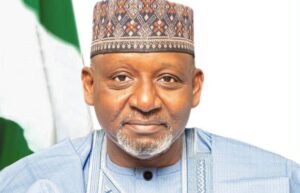Minister of Transportation Mu’azu Sambo says the Federal Government has taken charge of the country’s waterways through the implementation of Deep Blue project.

Sambo said this during the 2nd Edition of the President Muhammadu Buhari Administration Scorecard Series (2015-2023) in Abuja.
He said since the inauguration of the project in June 2021, the country had not recorded any case of piracy in its maritime domain.
”The ministry in its versatile and intermodal mandate has taken charge of the safety and security of the nation’s international waters in our waterways, and railway corridors in collaboration with a wide range of stakeholders.
”Now, it may interest you to note that the Gulf of Guinea is the most notorious region of the world, as far as piracy is concerned.
” To tame that in Nigeria’s exclusive economic zone, the ministry implemented the deep blue project, otherwise known as the integrated national security and waterways protection infrastructure.
”In order to prevent illegal activities in Nigeria’s maritime waters, thereby aiding regional security in the Gulf of Guinea and maritime organisation of West and Central Africa jurisdictions.
”The project is also aimed at enforcing maritime regulations to enhance the safety of lives at sea.
”With this impressive record, we are preparing to challenge the war zone insurance burden on Nigeria bound ships by the international shipping community”, he said.
According to the Minister, the Buhari administration also assented to the Anti Piracy Bill, adding that it is an important legislation which has defiled several administrations before 2015.
He said the legislation would prevent and suppress piracy, armed robbery and any other unlawful act against a ship, aircraft, and any other maritime traffic, including fixed and floating platforms.
Read Also: Green Shipping Corridors Take Off at COP27
He further said that the bill had opened the doorway for the administration of justice for piracy and other maritime offences in the country.
On inland waterways, he said Buhari’s administration had taken it as an alternative mode of transportation other than road, air and rail as it was cheap and environmentally friendly.
”We have over 10,000 kilometres of inland waterways in Nigeria, in addition to about 850 kilometres of coastal waters. So what business do you have moving containers from Lagos to Onitsha by road?
”If we develop our inland waterways sufficiently, then we’ll be able to have our goods competitively, the prices of our goods in the international market will be very competitive, just like importing goods will be very competitive,” Sambo said.
Kindly like us on Facebook/twitter















